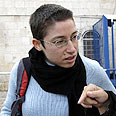
Disgrace at Western Wall
Why is it acceptable to treat women attempting to pray with such brutality?
I never questioned what my own response should be. Clearly, the arrest deserves to be condemned as state support for obscurantist religious coercion of the ugliest sort. Rather, I wondered what the men and
women at the Kotel who witnessed the confrontation and arrest thought and felt about what they saw. There were no reports of opposition expressed by anyone, no testimony about bystanders remonstrating with the officer that the arrest was unnecessary and unseemly.
I was surprised, then, to hear from my colleague Rabbi Ed Farber of Miami, Florida, about a strikingly similar event almost 40 years ago and the very different response it provoked.
“One Rosh Hodesh during a year when I was studying in Israel, in 1970-1971,“ wrote Rabbi Farmer, “there was a Rosh women’s minyan at the Kotel on the women's side. It was planned and advertised. The rabbi of the Kotel, whose name I don't remember, arranged for private security to be there. Only later did I understand why: What he asked them to do is something the police probably would not have done. They began to drag the women away from the Kotel as they were singing Hallel. (They had no intention of reading Torah.)
“The women offered no resistance, but no cooperation either. They were literally being dragged, with their skirts rising up on them and sometimes their hair getting mixed in, so that it looked as though they were being dragged by their hair, although I don't think they actually were.
Some men davening at the Wall suddenly freaked out. Some were Holocaust survivors who had seen Jewish women dragged through the streets in Europe by the SS. These men ran up to the rabbi and started screaming at him the kinds of things you would expect. Others were equally disturbed. Their point to the rabbi of the Kotel was clear: ‘No, they shouldn't be doing this, but they are Jewish women singing praises to God and you are dragging them through the streets?! You are wrong - you must stop. They are wrong but what you are doing is much worse.’”
Rabbi Farber added, “I remember it so vividly. I remember the look of horror on the face of one Orthodox man, who was a Holocaust survivor, and how he was screaming at the Rabbi of the Kotel, and then I remember him running up to one of the security guards who was dragging one of the women and trying to break his grip and yelling at him, ‘Nazi, SS! Stop! These are Jewish women! Stop!’ He was yelling in Yiddish. I know enough to understand what he was saying, but he was so freaked out that he was probably oblivious to the fact that it was doubtful the security guards understood Yiddish. The rabbi of the Kotel, though, most certainly did.”
What has happened to us in the 39 years or so since then? Why is it now perfectly acceptable to treat women attempting to pray with such brutality? An Orthodox rabbinic colleague commented to me on the day of the arrest: “That’s what it was like 40 years ago in Moscow: wearing a talit and carrying a sefer Torah in public could get you arrested. But that was the Soviet Union, a repressive totalitarian state; this is Israel in the 21st century!”
Rabbi Shmuel Rabinovich, the so-called “rabbi of the Kotel,” claims that the aim of the Women of the Wall was political, that they were out to provoke a response. For over two decades, the Women of the Wall have come together each Rosh Hodesh not to plant a flag but to open their hearts. If the police in the Old City are unable to see the difference between prayer and political protest, they need to be educated. The Women of the Wall come to pray.
If Rabbi Rabinovich, as a public servant drawing a government salary, is unable to accept as legal, even if not to his liking, something that competent religious authorities even among his Orthodox colleagues endorse, namely the practice of women’s prayer services, then it is time to replace him with someone whose loyalty is to the Israeli public and not to a reactionary sect willing to act in ways that called forth indignant revulsion on the part of Orthodox men a generation ago.
Rabbi Peretz Rodman is a past president of the (Masorti/Conservative) Rabbinical Assembly of Israel and chairman of the public affairs committee of Israel’s Masorti Movement. He lives in Jerusalem










